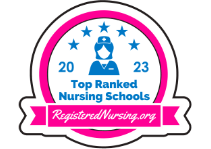Graduate & Continuing Studies News

2023 Best RN Programs in Minnesota | Concordia College Ranked #1
Selecting the best nursing school in Minnesota can be difficult. To make the process easier first look for a school that supports students towards licensure and beyond. A great way to measure this is through NCLEX-RN "pass rates." We have ranked the top 20 nursing schools in Minnesota by analyzing current and historical NCLEX-RN "pass rates", meaning the percentage of graduates who pass the exam, out of the 44 RN programs in the state. Programs reviewed include schools that offer an Associate in Nursing (ADN/ASN), BSN, or Direct-Entry MSN Degree.
Located in the beautiful community of Moorhead, Minnesota, Concordia College is where the art and the science of nursing are combined into an effective B.A. degree in nursing program. Both traditional and transfer options exist, and graduates are welcomed into the ranks of professional nurses after graduation and examination.
New Options for Transfer Students
The Cobber Completion Plan removes barriers for students to transfer to Concordia and complete a four-year degree.
General education courses no longer need to be individually evaluated to determine transferability and core equivalency. Students who intend to complete, or have completed, either an A.A. degree or the Minnesota Transfer Curriculum (MnTC) before coming to Concordia will understand exactly how their credits meet Concordia’s curriculum guidelines. This new policy will facilitate students who have completed a two-year degree to finish a major at Concordia in two years and will allow time and space for students to explore other courses of interest.
For more information visit the Cobber Completion page.
Read the full news article.
Alternate Path to Teaching Licensure
Minnesota's language teacher shortage gets a boost from a new program.
Dr. Cassandra Glynn, associate professor and director of the education department’s graduate programs, is collaborating with the Minnesota Council on the Teaching of Languages and Cultures (MCTLC) and the Professional Educator Licensing and Standards Board (PELSB) to help heritage language speakers become licensed teachers through an alternative licensure pathway, which is faster and more affordable than the traditional route.
“We have such a teacher shortage, and our K-12 students deserve teachers who love what they do and are willing to put in the work to complete the portfolio so that they can keep doing what they love,” Glynn said. “The leadership at PELSB understands the need to dismantle some of the barriers keeping teachers, particularly immigrant and Black, Indigenous, and People of Color (BIPOC) teachers, from getting licensed.”
Read the full news article.




